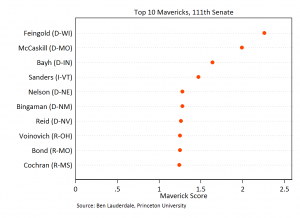How do we know whether a legislator is really a maverick? The word’s been used often to describe legislators from both sides of the political spectrum, such as Sen. John McCain (R-AZ) and Sen. Russ Feingold (D-WI), but as John Sides of The Monkey Cage writes, there’s no perfect predictor of how much of a maverick a legislator truly is:
Several prominent techniques (see here or here) estimate an “ideal point” for legislators using their roll call votes. That is, on what is typically interpreted as a liberal-conservative spectrum, we can tell where that legislator falls, at least relative to other legislators, based on their voting behavior in a particular session.
But no measure of ideology is a perfect predictor. There will always be “classification errors”; legislators can vote in unexpected ways on some votes. It’s easy to identify those votes — they might feature strange bedfellows, for example — but it’s harder to identify the legislators who are consistently more difficult to classify.
While there’s no perfect method for determining who the real mavericks are among our legislators, Ben Lauderdale, a Ph.D. student in the Department of Politics at Princeton, has developed an estimator to determine the biggest mavericks among our legislators, based on his definition of a maverick:
These “mavericks” are voting less on the basis of the political dimension that predicts all legislators’ behavior and more on particularistic factors unique to themselves.
Here’s a graph that clearly illustrates the Senate’s top 10 mavericks, using Lauderdale’s estimator:

I’ve always considered Sen. Feingold to be a maverick in the true sense of the word, because while he certainly does vote with his party a majority of the time, he’s never been afraid to do what he believed was right (Patriot Act, gun rights).
You can read Ben Lauderdale’s full report to find out how he came up with his Top 10 mavericks.


Despite being on the opposite side of most issues, I’ve been a defender of Feingold because he’s seemed to stand on principles and cross his own party at times. That said, some have made the claim that he’s more measured & calculating that he is portrayed – that he only breaks from the pack when his vote is irrelevant. I’d argue his vote against Patriot was definitely not irrelevant – that despite obviously not having any impact on the passage of the bill, the stand he took was at significant risk to him as a politician.
My point (finally) is this: does the author have some method for either filtering out or in some other way, highlighting guys who’s vote against party on an issue is approved by the party? For example, of the 30+ Democrats who voted against the health care reform bill in the House, a number of them looked to be facing tight re-election races and were released from voting with their party in order to help hold their seat. Situations such as this most certainly do not count as independence – in fact, it’s actually evidence of being more beholden to their party.